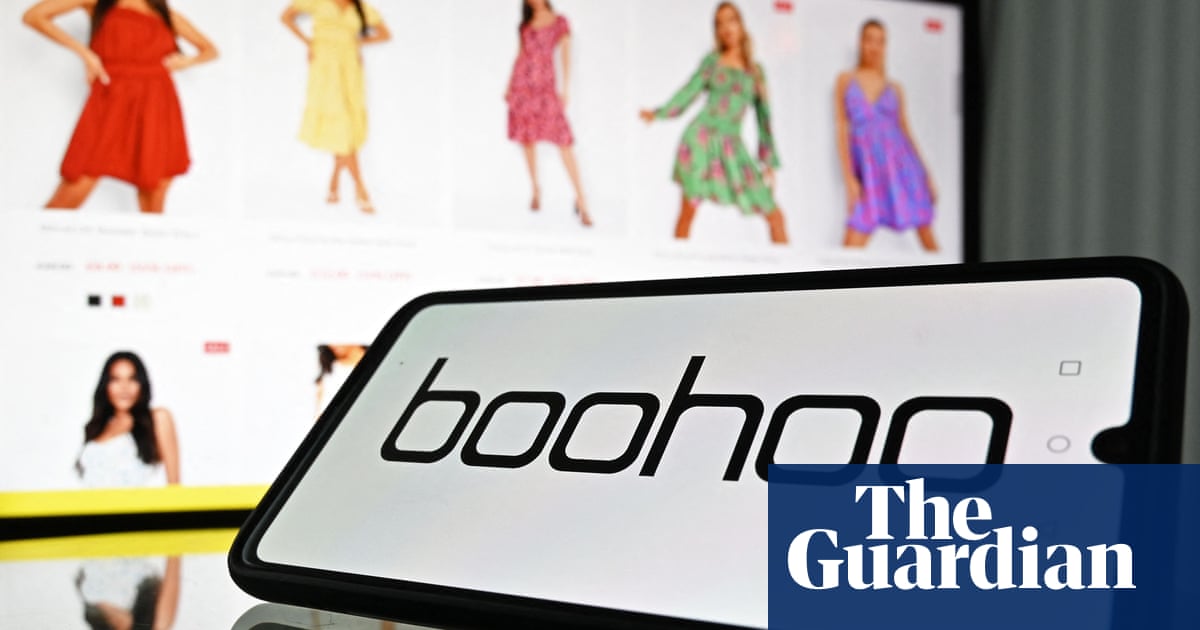
Strong sales of dresses and going-out clothes helped Boohoo capitalise on the online shopping boom seen during the pandemic, as it announced further measures to improve oversight of suppliers.
The online fashion retailer said its revenues grew 32% in the three months to May compared with the same period in 2020, even as Covid-19 lockdowns eased and high street retailers reopened their shops, providing increased competition.
UK revenues were strongest, up 50%, followed by the US with a 43% increase while sales in continental Europe and the rest of the world fell by 14% and 15%, respectively. Overall revenues are up by 91% over the past two years, with sales in the UK and US doubling.
John Lyttle, the chief executive, told analysts that the “phenomenal achievement” on sales “demonstrates the channel shift to online during the pandemic is here to stay”.
The company said sales were better than expected from both the group’s established brands and new labels including Burton, Wallis and Dorothy Perkins. It offered discounts on stock purchased as part of the deal to buy the brands. Sunny weather and loosening of lockdown restrictions in the UK had prompted a shift towards buying clothes for going out in, with sales of dresses rising above pre-Covid levels in recent weeks.
Boohoo relaunched the Debenhams website in April, selling fashion, beauty and homeware, with new ranges added. It bought the Debenhams brand and website out of administration for £55m in January, after the 243-year-old department store chain collapsed last year. The Debenhams name has disappeared from the high street, with all stores around the country closed, leading to the loss of about 12,000 jobs.
Ownership of the well-recognised Debenhams brand allows Boohoo, which has thrived in the world of fast fashion, to make a big push into beauty and homeware. Debenhams was the UK’s second-biggest beauty retailer when it collapsed. Analysts say the acquisition will help Boohoo appeal to older shoppers and enter new markets such as sportswear.
Boohoo has also relaunched the Dorothy Perkins, Wallis and Burton websites, after snapping up the brands for £25m out of administration in February, after the break-up of Sir Philip Green’s Arcadia Group, to which the brands belonged. As with Debenhams, Boohoo had no interest in the high street stores.
The strong sales performance at Boohoo came as it works to improve conditions among UK and overseas suppliers, after allegations of poor pay and conditions last year, particularly in Leicester where the group sources about 40% of its goods. The overhaul of Boohoo’s supply chain is being monitored by advisory firm KPMG and the retired judge Sir Brian Leveson.
Leveson said in a progress report, published on Tuesday, that Boohoo had taken the recommendations “extremely seriously”.
“My experience has demonstrated that any transformational change needs continuous investment of time and effort in order to embed the imposed business changes as permanent. That will be even more difficult in a business as dynamic as Boohoo.”
He added: “The progress and commitment are evident and has been the subject of positive comment from a number of those interested and engaged in the problems that Leicester has evidenced.”
Leveson said a small number of businesses had been removed froman initial list of approved suppliers, while new companies were in the process of being added.
Boohoo said it now planned to move to the more forensic Fast Forward auditing process for its UK factories over the next 12 months and would be employing compliance teams in several countries overseas.
Leveson said the group’s due diligence may now go well beyond that of other retailers. He said Boohoo’s work to check up on overseas factories might not be complete by September, the group’s deadline for publishing a list of all the suppliers it works with, but that aprovisional list should be made public on time.
Lyttle said: “We continue to make great progress on our agenda for change programme, with this morning’s latest report from Sir Brian Leveson outlining the seriousness with which the group is determined to develop and demonstrate a gold standard in our supply chain.”
Richard Hunter, head of markets at interactive investor, said: “Rectifying the reputational damage remains a work in progress and the share price has declined by 10% over the last year … Over the last two years, however, the shares remain up by 49% despite the dip and investor sentiment remains defiantly optimistic on prospects.”











